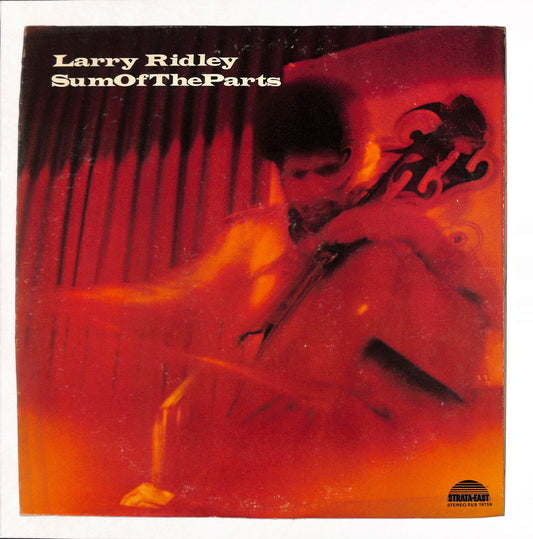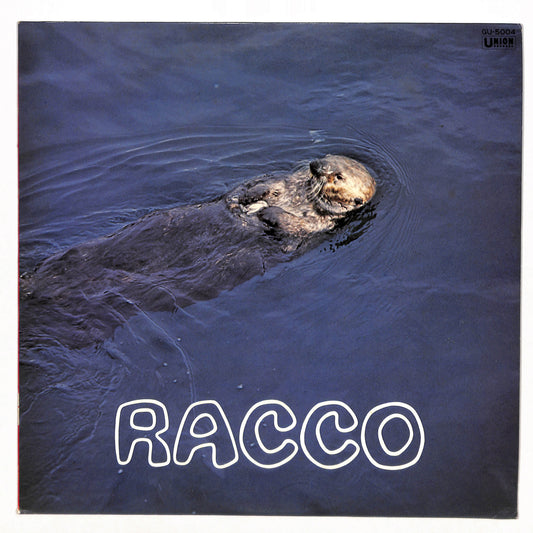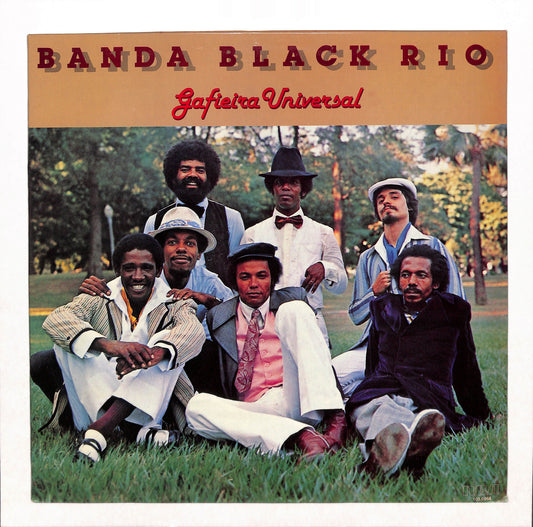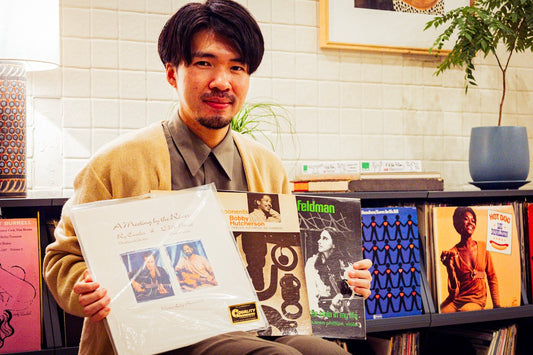"WHAT'S IN YOUR CART?" is an interview series where we invite record-loving guests to choose '5 Records They Want Right Now' from the ELLA ONLINE STORE lineup.
This time, we’re joined by FloFilz, a top German producer and beatmaker in the instrumental hip-hop scene. With a steady stream of releases on iconic labels like Melting Pot Music and Jakarta Records, as well as collaborations with emerging artists like Alfa Mist, Blue Lab Beats, and Jerome Thomas, FloFilz is making waves globally while connecting with the UK jazz scene. A frequent visitor to Japan, he enjoys record digging alongside his live shows and DJ sets. After recording his DJ set for AFTER HOURS SESSION, FloFilz selected five records at ELLA RECORDS VINTAGE that closely resonate with his own musical style—a truly “essential five.” In our interview, we delved into fascinating insights on Japan's record culture from an international artist’s perspective.
FloFilz - AFTER HOURS SESSION
FloFilz performed a special 60-minute set mixing DJ and beat live for AFTER HOURS SESSION video series.
Interview & text: Mikiya Tanaka (ELLA RECORDS)
Photo: KenKen Ogura (ELLA RECORDS)
Furniture design & production, Interior coordination: "In a Station"
Special thanks to: Satoshi Atsuta
FloFilz's “5 Records I Want Right Now”
①Larry Ridley / Sum of the Parts(1975)US original
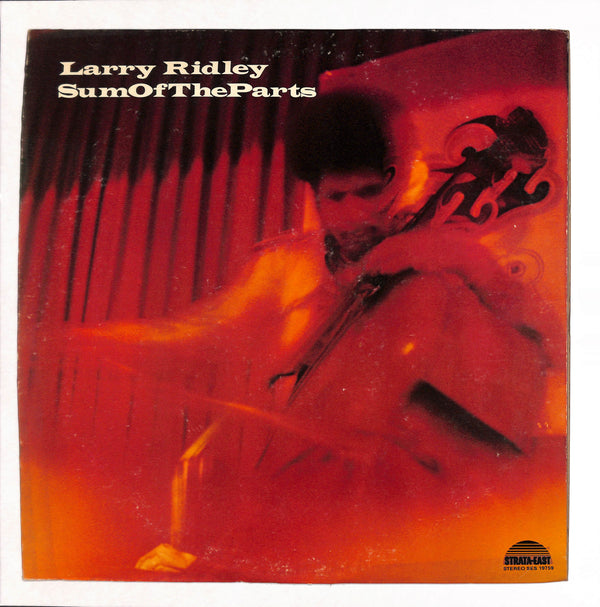
This time, I picked five records from different genres that I love as a listener. Larry Ridley’s album here feels underrated, but it’s truly beautiful. One of my favorite aspects is that, as a bassist-led project, it puts the bass front and center, which you don’t often see. And of course, it’s a Strata-East release—a legendary label with such a unique sound. I love when spiritual jazz elements are mixed in, and this album definitely has those vibes. Plus, the cover art is incredible. It’s also cool that Nujabes sampled “Feelin’ Blue” from this album.
②Furusawa Ryojiro Quartet / Racco(1977)JPN original
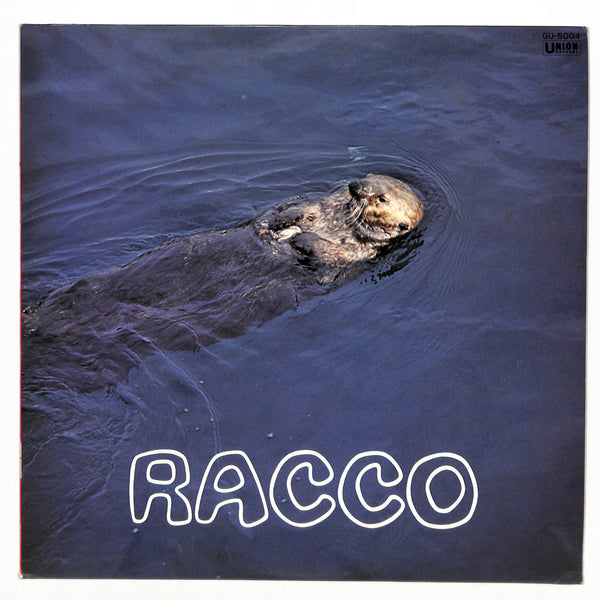
This was actually the first Japanese jazz record I discovered. I think I came across it while exploring new music on YouTube back then. The cover is super cute, right? When I listened to it, I was struck by how unique the sound was. I love the tone of the Fender Rhodes, and this album has some amazing tracks featuring the Rhodes and sax, plus incredible compositions. Not only is the sound fantastic, but the recording quality is top-notch. Japanese jazz in general seems to have really high-quality mixing and sound; even in my room, it feels like I’m experiencing a live performance.
I first tried to find this album on my initial trip to Japan, but I couldn’t locate it then. But the last time I visited, I finally found an original pressing in Osaka. It was incredibly expensive, so I left without buying it. But the next day, I kept thinking about how rare it is, and someone else might snatch it up... so I decided I had to go back. I ended up splurging on it. Even though I already own the reissue, this album is special to me, so I really wanted to have the original. Seeing it available as an original pressing on ELLA ONLINE STORE brought back some memories.
This album also connected me with a friend. He’s a French guy who lived in Osaka for a few years. He loves this artist and Japanese jazz, but he hadn’t heard of this album. When I introduced it to him, it quickly became one of his favorites too.
③Banda Black Rio / Gafieira Universal(1978)Brazil reissue
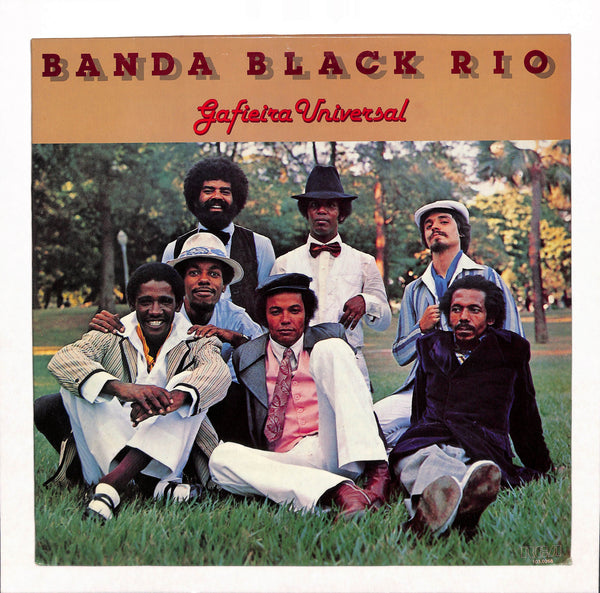
This is an amazing record that mixes Brazilian music with funk and soul styles. It’s premium dance music, so I still play it in my DJ sets when I want to get everyone moving. And it’s not just the upbeat tracks—the smoother ones are fantastic too.
Lately, I’ve been diving deep into Brazilian music, and many of the records I buy are Brazilian. It’s such a diverse genre, full of discovery, and I think it’s one of the best in any category. Even if you don’t understand the language, you can feel the emotion and groove. Last month, I found some great Brazilian records when I was in Lisbon, but I definitely want to visit Brazil someday. This album is pretty rare—even the reissues are hard to find. Banda Black Rio is still active, with the sons of original members carrying it on. If they ever do a show in Germany, I’ll definitely be there to see them live.
④De La Soul / Stakes Is High(1996)US original
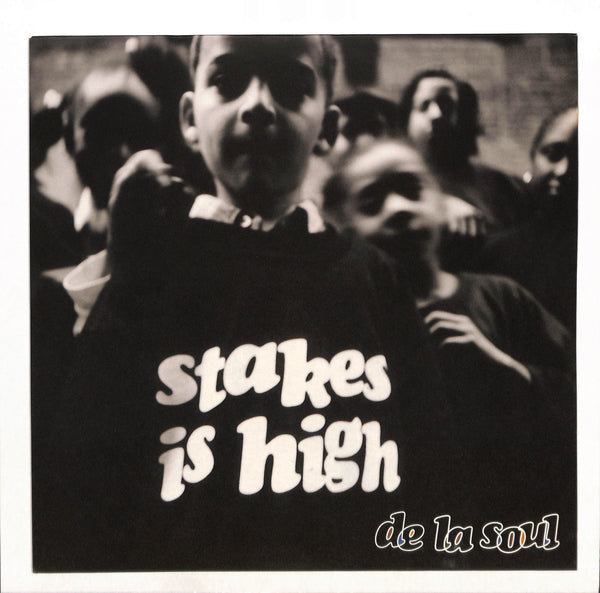
I wanted to pick a hip-hop record too, and this album is a pillar for me, especially since it features tracks produced by one of my biggest influences, J Dilla. I listened to this album non-stop when I started making beats, and its beats served as exercises for me, too. It’s packed with the best grooves and gave me so much inspiration. This album also bridged hip hop and jazz—Robert Glasper, for example, covered the title track, which I think is amazing. Seeing jazz musicians cover hip-hop tracks, with each genre inspiring the other, is the coolest thing. This is truly a legendary album, with timeless sound production and incredible rapping.
⑤Tatsuro Yamashita / IT’S A POPPIN’ TIME(1978)JPN original
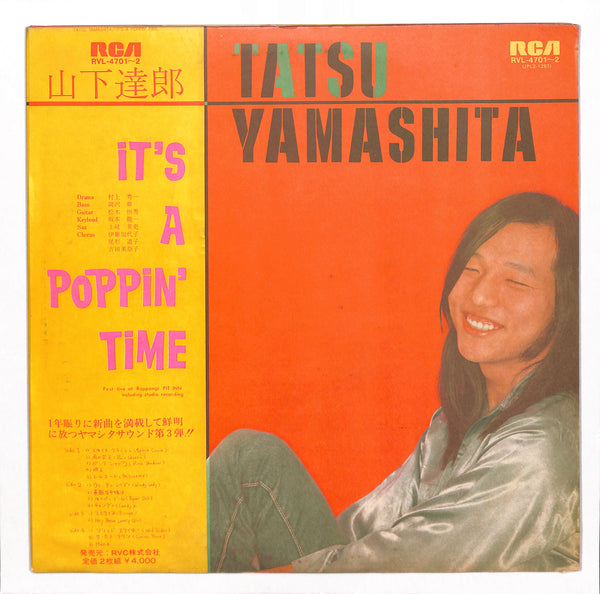
For people in Japan, I think Tatsuro Yamashita is seen as a true legend of Japanese pop. I’m not sure if “City Pop” is a commonly used term in Japan, but here in Europe, it’s really taken off over the last few years as a genre label. There’s so much amazing music in it. I love the blend of jazz, funk, and other elements—it has such a unique sound and energy. City Pop is obviously influenced by American music, but there’s something more to its vibe. It’s hard to put into words, but it feels like they’re adding fresh elements on top of those influences, blending things together with an experimental spirit. Whether it’s the use of synths, guitar tones, or vocal styles, it all comes together in a way that’s... well, kimochii (feels good) to me.
Actually, I already own this album—it was a gift from a friend when I visited Japan last year, and it holds a special place in my heart. I especially love “Solid Slider.” It's an amazing live version with a killer sax solo that I might even prefer to the original on SPACY. I mean, I love SPACY too, of course. With legendary Japanese musicians contributing, it makes total sense to include this in my selection. I’ve been digging into City Pop for a while now, and there’s always something new to discover.
Interview: FloFilz and Record

━━Can you tell us about how you first got into records?
FloFilz: My parents are classical musicians, so I grew up surrounded by music. My dad also listened to jazz and Brazilian music, so we had records from those genres at home as well. When I was a kid, I mostly just looked at the records, but later, when I moved out on my own, my dad gave me a part of his records, and that’s when my love for vinyl really took off.
━━How often do you visit record shops?
FloFilz: I go pretty often. In Berlin, where I live, there are a few familiar record shops I visit two or three times a month. When friends come to visit or when I’m showing someone new around Berlin, I’ll take them to these record stores, so I probably end up going even more often. Also, whenever I’m on tour or traveling, I make it a point to check out the local record shops. Records bought on trips become tied to those memories—later, when I listen, I’ll think, “Oh, I bought this in Tokyo” or “I found this in Portugal.” That connection between the record and the memory of the trip is something I really enjoy, so yeah, I visit record stores a lot.
━━Are there as many record shops in Berlin as in Tokyo?
FloFilz: Not nearly as many as Tokyo. But I’d say Berlin probably has the most in Germany, compared to other cities. Being the capital and a big city, it has a variety of quality shops across different genres. Most people associate Berlin with techno, but there’s a strong scene for pretty much every genre here. The hip-hop scene is pretty solid, and it’s also a big city for live shows, with venues hosting jazz, funk, and lots of other genres.
━━How about Krautrock’s popularity in Germany? In Japan, it still has a devoted fan base and is respected as a genre that heavily influenced the next generation of musicians.
FloFilz: It’s probably not as popular here. Can, for example, is well-known, but I’m not sure if Krautrock has the same level of popularity in Germany as it does in Japan. I don’t know that many artists myself. But I sometimes come across amazing Krautrock records when I’m digging for sampling material, so there’s a bit of rediscovery and re-evaluation happening through that kind of record digging. It’s not a major movement, though. It’s kind of like some Japanese artists who are more popular overseas than they are in Japan—Krautrock might feel like that to us.

━━How many records do you currently own?
FloFilz: I’ve never actually counted, but I’d guess around 1,000. I’ve got a large record rack at home, but it’s already filling up, so I’ll need to expand soon—and then I’ll probably buy even more. Last time I was in Japan, I picked up over 100 records, and I had to buy an extra suitcase just to bring them back (laughs). Most of my collection is LPs and 12-inches, but I’ve been buying more 7-inches lately. They’re easier to bring back from trips and take to DJ gigs (laughs). Plus, I just love the cool format of 7-inches.
━━How do you organize your record collection?
FloFilz: I try to keep it organized by genre and country. It’s not alphabetized, though. I have sections for UK music, Brazilian music, a separate section for Japanese jazz, and a general jazz section… things like that. Jazz makes up about 60% of the whole collection.
━━When did you start listening to jazz?
FloFilz: One reason was that my dad would play jazz records occasionally. Another memory is of this Casio or some kind of keyboard we had at home—it had demo songs you could play with the push of a button, and a few of them had a jazz-funk vibe. I loved those and would play them all the time as a kid, so I think I was already drawn to that style. Later, when I got into hip hop, I started discovering jazz as a sampling source and then got deeper into it from there.

━━When did you start making your own music?
FloFilz: My first instrument was the violin, which I still play. I started at around age four, and at first, I was just playing, but eventually, I started composing for the violin as well. I began beat-making around 2011 or 2012. I got an AKAI MPC2000 first, experimented with it, and then quickly added a Roland SP-404, working with a computer and sampling keyboard to make tracks.
I got into beat-making because I was really into hip hop as a listener around 15 or 16. I was captivated by jazzy beats from artists like A Tribe Called Quest, and then I got into instrumental beatmakers like Pete Rock, J Dilla, and Madlib. By then, there were some instrumental beat artists in Germany releasing on Melting Pot Music, the label I release on now, so I was already a listener for the label before I started making my own beats. For example, there’s Dexter, who makes beats from jazz samples. I actually noticed that Disk Union has this wall design with classic album covers, and I was shocked to see one of Dexter’s album covers up there! I’d never expected to see a German beat album on that wall (laughs). I was also inspired by Hubert Daviz in Germany; there’s no one else who makes jazzy beats quite like him. So, in the beginning, I just listened to a ton of beats and started by trying to make something similar myself.

━━Do you have a strong preference for original pressings?
FloFilz: I don’t have a strong preference, really. As I mentioned earlier, there are some works that I have a deep connection with, and I definitely want to have those in their original pressings. That said, I enjoy the process of hunting for originals in record shops, and when I finally find a rare original pressing, it’s exciting. I do think owning the original pressing is something special. However, I don’t mind reissues that much. There are plenty of high-quality reissues available. Of course, there are times when a reissue has poor sound quality, leading me to seek out the original later. But I really appreciate the existence of reissues that can be obtained for much less than originals.
━━What’s at the top of your current record wantlist?
FloFilz: It's a Finnish jazz record called Sauna Jazz (1974) by the Martti Pohjalainen Trio. It has this weird cover with a half-naked guy holding sauna equipment (laughs), but the music is fantastic. It’s quite rare, and I still haven’t found it.
Another one is Music to Massage Your Mate by (1976) by Robert Wotherspoon, a kind of American easy listening record. This one also has a strange cover of a guy massaging a woman, and inside, there are photos explaining how to give a massage (laughs). This one is also pretty rare.
There are also a few Japanese jazz records I’m looking for, though I can’t recall the artist names right now.

━━Are there any genres you're particularly searching for or currently into?
FloFilz: As I briefly mentioned earlier, I’m really into Brazilian music and I’m searching for various records in that genre. Brazilian music is quite diverse and interesting, ranging from funky stuff like Banda Black Rio to MPB like Djavan and classic bossa nova. I’m also looking for various Japanese records. Not just jazz and pop, but also rock and psychedelia with good drums. I’m into ambient and experimental music too. Lately, I’ve been leaning more towards ambient sounds, regardless of whether they’re Japanese or not.
━━Are there any hot genres or trends changing in the beat-making scene right now?
FloFilz: That’s a pretty tough question. It really depends on personal taste. I do get the impression that many producers and beatmakers are focusing on sampling jazz and Brazilian music, but a lot of those sounds have already been used. So now, I think a lot of people are searching for a wider range of genres or more obscure sounds. For example, psychedelia and progressive rock are becoming popular, and even Japanese music like city pop might gain more traction as a sampling source. But again, it's hard to pinpoint trends. Popular beatmakers like Alfa Mist sample from a really wide variety of genres and constantly check out all sorts of sounds, including obscure ones.

━━What kind of music do you mainly look for when you come to Japan?
FloFilz: I focus on finding things that are hard to get in Germany or Europe. So, I tend to look for Japanese jazz quite a bit. While you might find slightly rare Japanese jazz records in Europe, they’re usually much more expensive than in Japan.
I also check out soundtracks from older anime from the '70s. Of course, I look for famous ones like Lupin, but there are also soundtracks from lesser-known anime that can be really funky or jazzy and cool, even if they’re not well-known in Europe. I’m not very knowledgeable about anime, and I can’t read Japanese, so I often choose based on the vibe of the cover or the credits for the instruments, and I listen to samples to decide. I’ve had quite a few encounters with some cool soundtracks that way.
But beyond just Japanese music, I think the selection in Japanese record shops is fantastic across all genres. There are many shops that specialize in hip-hop, Brazilian music, and other genres, so you can find a lot of great records. This time, since I have enough space in my suitcase, I can bring back even more (laughs).
━━Are there other differences you notice between record shops in Japan and Europe?
FloFilz: First and foremost, Japan has a much larger number of record shops. This means there’s a greater quantity of records, and the overall selection is on a whole different level compared to Europe. Additionally, the organization of products in Japanese shops is very meticulous. For example, in jazz sections, you often see records organized by instrument, like piano or saxophone. I don’t think there are many places in Europe that go to that extent.
Another thing I notice is that record culture is well-established in Japan. There are many people who regularly visit record shops, and the scale of the culture seems larger than in Europe. Just a few days ago, I witnessed a businessman browsing records during his lunch break, and I saw an elderly man buying a lot of records in a short amount of time. It’s really special to see record enthusiasts from all walks of life and generations like that. Japan also has a good number of record music bars. There weren't any like that in Europe, but recently, it seems that new ones have been opening over the last three or four years, inspired by Japan. Record shops themselves are gradually increasing, and it feels like Europe is currently in a phase of reevaluating records.

━━What does a “good record shop” mean to you, FloFilz?
FloFilz: Personally, a good record shop has a nice selection that includes both vintage records and some new releases. The atmosphere is important too. I prefer places where the staff is passionate and eager to show off the new arrivals. On the flip side, shops where the owner seems grumpy, gets angry, or dislikes conversing with customers are not as appealing.
Speaking of which, just yesterday I was chatting with Oliver von Felbert (the founder of Melting Pot Music who came to Japan with him), and we both agreed that it’s great when there’s a community around a record shop. A shop that serves as a meeting place for people and helps form a certain music scene can definitely be considered a “good record shop.”



